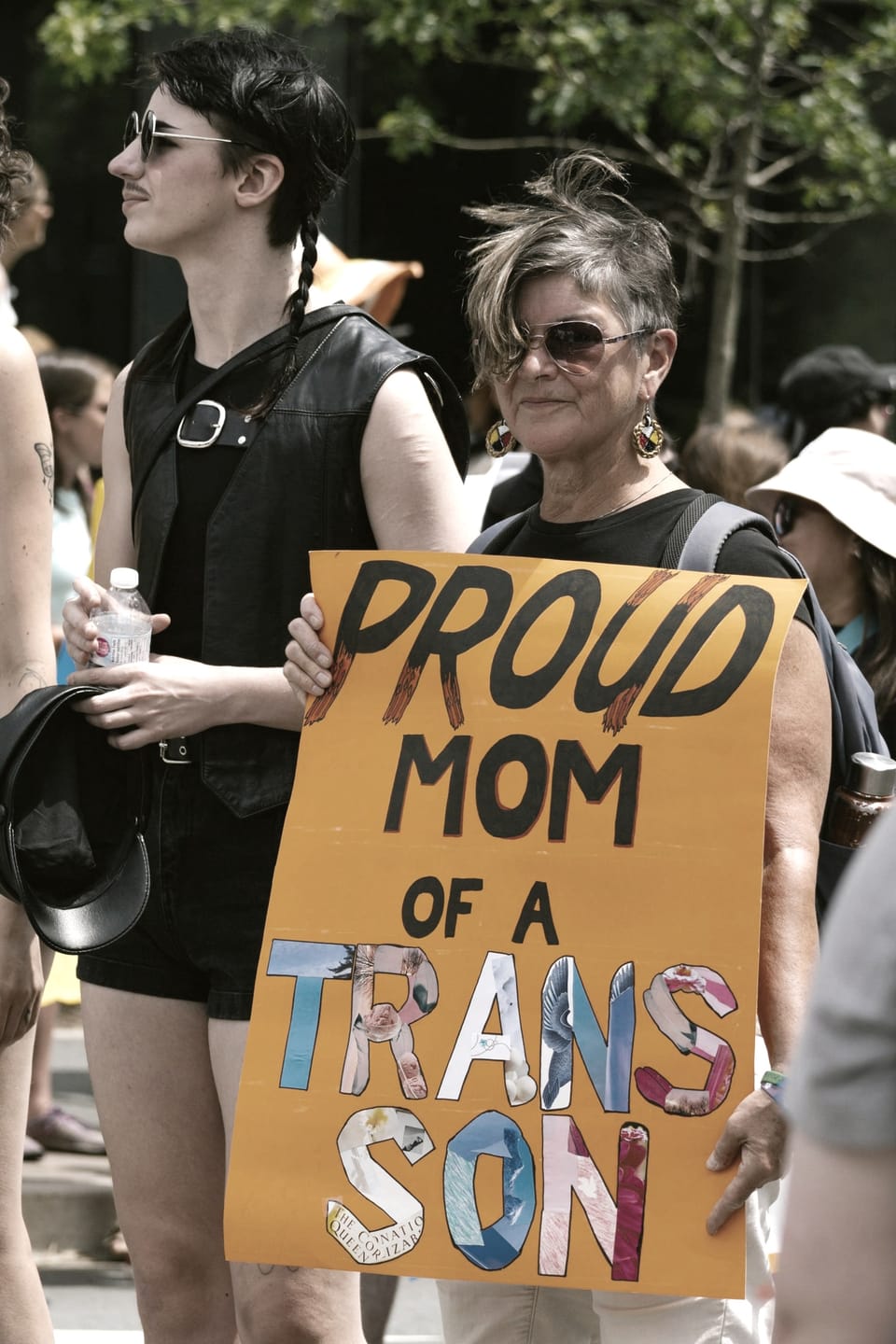A pause, a mark on the timeline
The past eight days have been hard on our community. How are you?
After a white, right wing activist was murdered in Utah by another white, right wing activist on September 10, 2025, the American right wing hate machine exploded, spewing even more—and louder—conspiracies and lies about trans people, including, just yesterday, that they should be institutionalized.
We are feeling it.
Gender Defiant is devoted to nuance, not news. But it felt odd to bring you a regular essay and not pause to feel the reverberations. Our regular format returns next week. Meanwhile, here are impressions of the week, like postcards, from some of us. Sent with gratitude. We are grateful you are here. We are here with you.
How are you? Let us know in the comments.
“A trans person in my feed posted still here, still trans after Trump was reelected in November. I think of that post all the time: still here, still trans. The comma a calm between here and still, the lowercase S’s. An incontrovertible declaration, yet so understated it was almost funny—the brevity of it in my feed amid all the post-election right wing bombast and fearmongering. Still here, still trans, a take on marking yourself safe in a hurricane or mass casualty incident (as they call it on The Pitt). Now the scale of that four-word testimonial takes my breath away. Until last week, I could sense the hate, but most days it was, to me, like a dentist drill in the next room, constant and awful but not impossible to keep some distance from or drown out. Over the past week I felt the zone of normal I work every day to keep around my 18-year-old daughter get tight. (What was that zone made of? Time? Rule of law? A faith that most people are reasonable?) Like the wall between us and the worst is breaking, leaving just my skinny arms for a shield. The worst is wondering if the hate could break my kid’s own faith in herself. She is invincible though, a force, thank God for the invincibility of teens, their iron certainty they are immortal. I am leaning on that a bit tonight.”
* * *
“I walk in the bitter cold to our senator’s office with nine other parents of trans kids; we want to make sure the senator doesn’t forget that he also represents our children. It’s February under the new administration. Another way we’re marking the passage of time this year: there are 500 anti-trans bills that have been introduced across the country, 25 of which have passed. “Our children are being hunted,” one of us says to the senator’s aide.
I remember then, when I was in my early 20s, on a fellowship in another country, and war had broken out: curfew, shuttered stores, families fleeing in packed vans, fighter jets, explosions, tent camps. When my friend suggested we leave the house to interview a local writer, I shook my head. Drive with fighter jets overhead? Was she insane? What she said next changed the trajectory of my life. “Who wants you to be afraid?” I pulled my hair back, grabbed my notebook, and followed her into the street.
Now there are nearly 1000 anti-trans bills, 122 of which have passed. At the doorway to a church that’s hosting a training on how to respond when ICE shows up in your neighborhood, I hesitate. I don’t know if it’s because of my time in the war or the threats to the Left this week calling groups like the one hosting the training “terror cells,” but I hesitate long enough that I wonder if my friend Flora notices. I’m afraid a sniper is in the porticoes—that someone will, as the White House deputy chief of staff has requested, “do it in Charlie’s name.” Meanwhile, ICE is, under cover of night and under cover of masks, detaining and deporting our neighbors. I remember what I learned in the war. Who wants you to be afraid? I have to step through the doorway.”
* * *
“JJ and I, in Mexico now, are at a remove. This country’s colors and flavors are new. We came here with just six suitcases between us.
We are, at the most rudimentary level, learning a new language. We live among people with whom we cannot easily speak.
When your child’s whole being is threatened, due to no fault of their own, you are forced to reconsider your perspective. This week, I can see that my effort to spare my child the violence of our home country has spared me.
In Mexico, the clench of my jaw has unclenched over our first two months.
If it weren’t for my kid, I would never have left the United States. Not because it was great, but because it was home, and I felt safe.
The individual who was murdered last week is the same individual who created the “Professor Watchlist” on which I found myself years ago for having taught books by queer writers.
When JJ first came out, I wondered if I, as the parent of a trans and queer kid, would be destined to live in fear and dread.
Yet from the very beginning, everything about my kid coming out has continually invited me in.
I am writing this while waiting out a rainstorm, taking cover in a sandwich shop. JJ is back at home in our (new) spare apartment, doing their homework. They are safe.
I am safe.”
* * *
“I was in a Teams meeting last Wednesday when I started getting texts from friends, a digital flurry of exclamations and reactions. I opened my phone to check the news while listening to marketers discuss upcoming projects. I watched the video (ill-advised, visceral) of the Utah shooting, then I went on about my day.
It is what it is. When I was in my 20s and first became exposed to that idiom, I despised it. Like really, what in the actual fuck is it? What it is isn’t really an answer at all but an ouroboros of words, the snake eating its tail: a non-thought that concludes its own origin with demise. In the late 90s, when I was introduced to the term “thought-terminating cliché” (a category for the kinds of “verbal stop signs” meant to shut down debate or cognitive dissonance with a bumper-sticker-type slogan), my relationship with it is what it is was further complicated, as I only thought about it more. By the time the global pandemic hit, I had begun to utter it out loud as a kind of ironic mimicry of the idiots who rely on it in the face of minor inconvenience and major catastrophe: a tire blowout, a school shooting, a humanitarian disaster.
But the thing about that type of mockery is that when practiced enough it becomes a snake of its own, a reflexive internalization of a term you once despised. So that now I find myself saying it sincerely.
It is isolating to feel like things are truly fucked. Like I am only a singular, powerless embodiment of consciousness with no control over the machinations of the body politic. It is what it is this week.”



